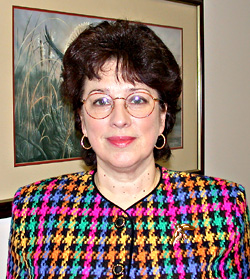| |
|
Debra Goodwin Recommends |
 JACKSONVILLE -- April 10, 2002 -- Heart disease is today’s number one cause of death in women over 50, according to Jacksonville State University’s Debra Goodwin, instructor of family and consumer sciences. “Being proactive about heart disease may help women decrease their risk of developing the disease,” said Ms. Goodwin, who is pursuing her doctorate at the University of Alabama. According to Goodwin, being proactive means paying attention to six risk factors.
“If these terms are among the first three ingredients, there is substantial trans fats, so you should keep looking for a food that lists hydrogenated fats further down on the list of ingredients or look for new products that carry the phrase “no trans fats.” Goodwin also encourages women to eat the recommended daily amount of fiber--between 20 and 35 grams per day. The best sources of fiber are whole-grain cereal, whole grain bread, fruits, vegetables and dried beans and peas. A half-cup of pinto beans contains 10 grams of fiber, or half the recommendation. And Goodwin warns that Americans consume too much sugar in the form of simple sugars that sweeten such items as soft drinks. “It is reported that the average American drinks about 40 gallons of soft drinks a year. That calculates out to be around 60,000 calories. When we add other sweets like candy and donuts, we are consuming a large amount of simple sugars,” she said. “The recommendation for simple sugar intake for a healthy diet is around ten percent of the total calories consumed. However, the average intake in America is about 25 percent of total calories. Food producers use a variety of terms for sugar. These include sucrose, glucose, maltose, dextrose, fructose and corn syrup. If any of these terms are listed first or at the top of the list of ingredients there is probably a lot of sugar in the food.” For more information, contact the nutrition faculty and students in the Family & Consumer Sciences Department at JSU at 782-5054. |
| © Copyright 2002: Jacksonville State University | Pagemaster | ||||